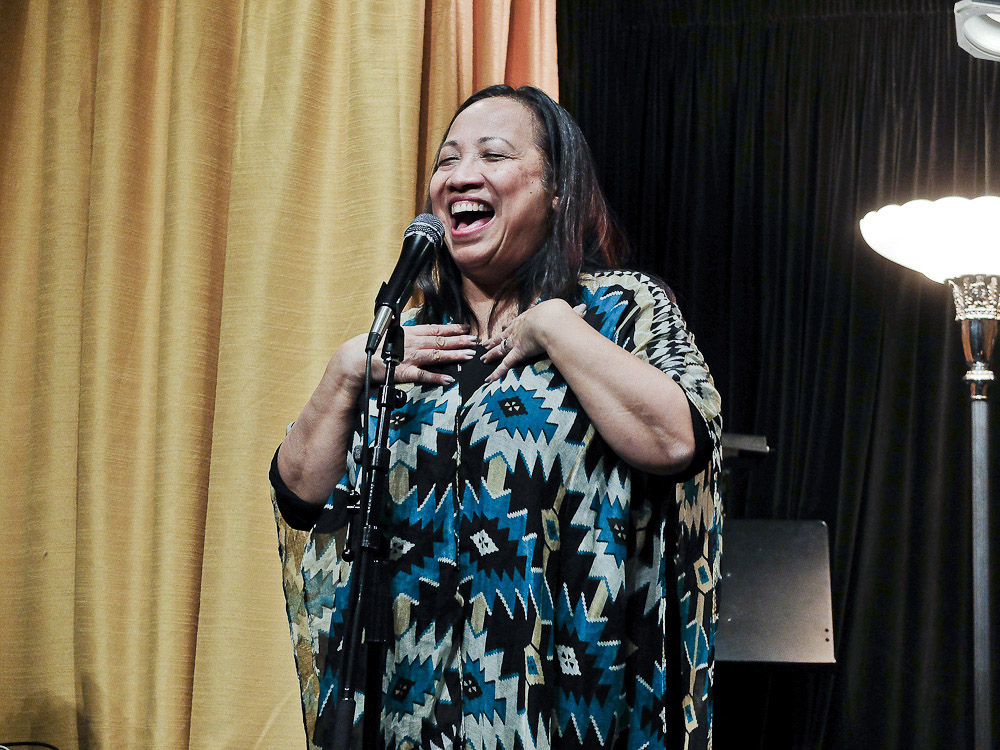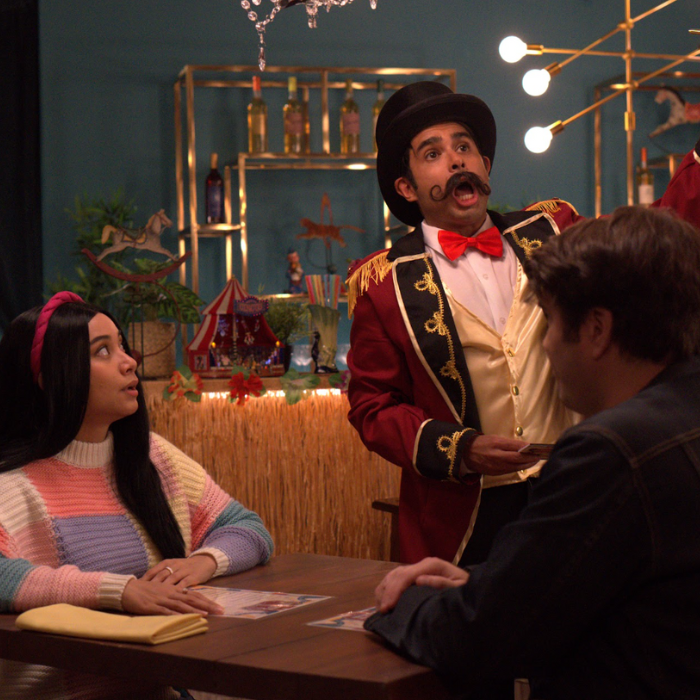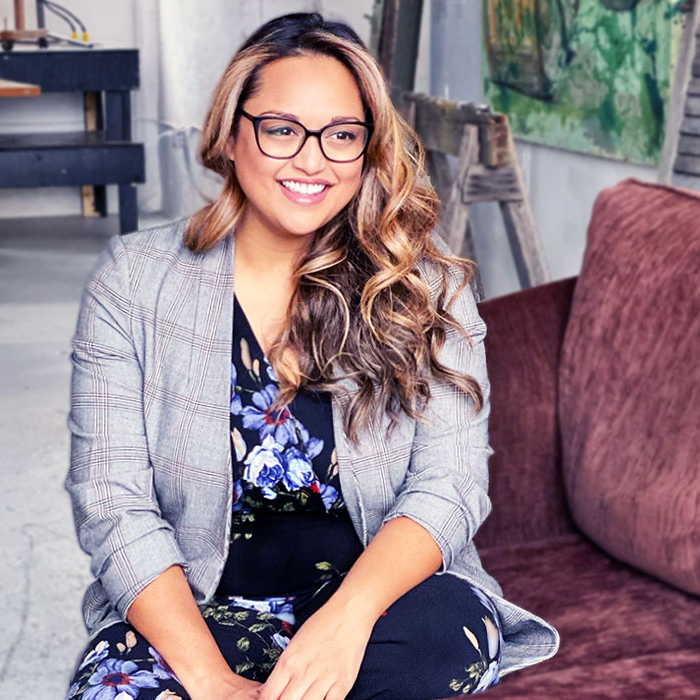When I met with Carolyn Fe for our scheduled Zoom call, it was at the exact date and time that her episode of Blues Clues & You! was premiering.
The Filipina-Canadian actress, singer and songwriter squealed with excitement as she celebrated her debut as Lola in the Nickelodeon remake of the iconic ’90s’s children’s show.
“My feet are not touching the ground! There’s so much excitement happening around me,” said the 59-year-old, who’s won awards both for her work in theatre, on-screen and in music. “This is HUGE.”
Indeed, introducing a Filipina grandmother in global television programming for kids is a pretty big deal. Starring Filipino-American actor, Josh Dela Cruz, as the live-action host, Blues Clues & You! has received much praise for including a man of Asian descent in the starring role on a kids show.

However, Josh’s nationality on the show remained a mystery until a preview of the episode that introduced Fe’s character, Lola, was released.
Fe’s episode, which debuted on “Blue Friday,” a day dedicated to celebrating families, sees the introduction of Lola in “Blue’s Big Baking Show,” as Josh and Blue spend the day making “binbingka,” a cake from the Philippines that Lola says is “masarap” (delicious!). According to Nickelodeon, the current second season of Blue’s Clues & You! will continue to explore Josh’s Filipino-American heritage by incorporating traditional foods and Tagalog language.
For the Montreal and Toronto-based actress, being part of a program that centres on Asian culture is a stark cry from her early years in the entertainment industry.
“[When I was a ballerina], it was [during] a time when diversity wasn’t it,” she recalls. “Having to wear lighter coloured wigs, contact lenses, foundation, makeup and tights just wasn’t my game.”
The feeling of not belonging led Fe to quit her dance career and go into a corporate job for 20 years. However, she felt a yearning to express herself and make her voice heard, and in 2005, she found her way back onto the entertainment scene, starring in Miss Orient(ed), a play written by Nadine Villasin and Nina Aquino that gently satirized the struggle between conflicting cultural identities and beauty. She would later go on to launching a successful Blues career and release four albums featuring original songs that payed homage to her Filipina roots, all while continuing to her acting career.
Read on to learn about Carolyn’s experiences growing up in a Francophone town in Canada, finding her voice through her performing arts, and her continued mission of breaking Filipino stereotypes.

On moving to Canada and the racism she endured
My mother remarried an American and he grew up in Berlin, New Hampshire. My stepdad was a teacher and he was looking for a job, ideally in the hometown, but he couldn’t find one. So he found one in Laval, Québec, a suburb of Montreal. That’s how we got to Canada. I was seven or eight years old [at the time].
I have a younger brother and [moving to Canada] sealed our relationship. In the Philippines, we were all with our own friends, but coming into a Francophone environment, we were literally pointed at. My parents would force us to play outside in the front yard of our apartment building because we were introverts. And we would be playing, but the kids around would literally make a parameter around us and watch us like a show. It was awful. They would point at us and [call us names], the lighter version of it was the “ching chongs.” That marked me. From the first time we stepped out of the apartment, it was clear we did not belong. And the question of, ‘Do we even want to belong?’ was already there.
It was really, really tough. And then going into primary school, elementary school where you’re the only people of colour, the school even assumed we wouldn’t be up to par. So I was supposed to be in grade five and my brother was supposed to be grade four. Instead, I was put in grade four, my brother in grade three, because they automatically assumed we were not up to par.
During the classes, I clearly remember biting my tongue because my classmates couldn’t even read English fluently. And here I am, reading as if it’s nothing and the kids are saying, “Wow, she can read.”
With math, which is not my favourite subject and never was, they were doing addition and subtraction, but very basic things. When I left the Philippines, we were doing division. I was two grade levels higher than [my classmates in Canada]. Six months later, my parents came back to the school and said, “Well, have they proven themselves?” So they moved us back up to our proper grades. But even then you still have the of being outside, which stays with me even today. I’m 59 years old and it’s still there.
On finding an outlet for her voice through the performing arts
My mother has a love for the arts so she gifted me with music, dance, acting and ballet lessons to get me out of the house on the weekends. I was a ballerina and got all the eye rolls my family could give me, but I was successful in contemporary dance in that I was able to pay rent and eat. But that was at a time when diversity wasn’t “in” and having to wear lighter coloured wigs, contact lenses, foundation, makeup and tights just wasn’t my game. So I quit and went into corporate for 20 years.
However, [I found] there’s nothing like expressing who you really are on stage. And they cannot say anything because they have to pay attention to what you say. In 2005, I had the opportunity to start in music because a friend of mine said, “Hey, let’s start a band.” I said “Yes, but I will not do covers. I want us to write original songs because I feel a lot and there’s a lot I have to say, and I can’t say it talking, so let’s sing it.”
Later in 2005, I got called to do an audition, for Miss Orient(ed), written by Nina Aquino and Nadine Villasin, and I got the part. And I found that in theatre, the words are so specific that whatever the actor says, the audience gets, whereas with singing, there is that fourth and fifth wall and once you sing it, your meaning is no longer your meaning, it’s the audience’s meaning. And with acting I thought, “Oh, this is scary because the audience is getting it.” So with acting and being able to say words or choosing products that said what I wanted to say just sparked something in me. And that’s my comfort zone, it’s a very safe way to make my voice heard.
I like the fact that when I’m on stage there is that fourth wall and people have to listen to what you say without interruption, because one of my fears is to be interrupted or seen as an aside like I was when I was younger. In those days, because of my physical look, people were always putting me aside, rather than listening to what I wanted to say. I just wanted to play with the kids, that’s all I wanted. Instead, I was pointed at called “ching chong” and slanty eyes.

On incorporating her cultural roots into her art
[Incorporating Filipino culture] is important to me to break the stereotypes. We’re not all nannies or not all caregivers. And once that stereotype is broken, I hope [others] will see that the people behind the stereotype are just regular people with the same baggage that anybody carries. Once people see that, I hope that it levels the playing field for everyone and [encourages] acceptance of our differences. There are slight differences in every culture, but the bottom line is, we all have the same questions in our hearts and in our minds. And the question of “Do I fit in?” is universal for everybody.
With Blues Clues & You!, the [inclusion of Filipino words and sayings] were already scripted because Josh [Dela Cruz] is Filipino American. However, the actions between Josh and me, like the mano po, were done by us. After we did it, the production team, the camera people and the director said, “What was that?” But it came naturally to me and Josh because we’re Filipino and we had to explain to them that every time you see an elder, you do the mano po. So they kept it in. And there will be a lot more Filipino nuances in future episodes.
On being part of Blues Clues & You!
It’s huge that the main characters are Filipino. I just imagine toddlers seeing Josh, the straight hair, the skin tone, the eyes, the mannerisms that their own parents do, and it’s huge. I get shivers anytime I get asked this question.
I have a half-sister who’s 15 years younger than me and she watched the original Blues Clues. And by default, because I babysat her, I watched Steve [Burns], the one in the green striped shirt. And I thought, “Well, okay. Is that it?” But this time around, having Asian representation, it’s huge. I had an interview with the Philippine national TV network the other day, and they just sent me the clip before I logged on. And it hit me that these kids in the Philippines are watching it. And if they are watching it, who else is watching around the world? Now, [children of different backgrounds] will know about Asians [and their culture].
On finding inspiration from younger generations
I’m so happy for the second and third generations here [in Canada]. When I see them, they’re in their element and they can stand their ground. When [people were protesting for] Black Lives Matter, there were all these second and third-generation Asians hopping in… that’s something I wouldn’t even have thought of doing because I wasn’t brought up like that. They are saying what I’ve been wanting to say ever since we were forced to play outside in the yard. I’m so impressed by them and [now] I try to use my platform as much as I can for righteousness and for equality.
[There was a time when] I was ashamed of being, first a coloured person, and second a Filipino. At one point, I denied anything Filipino, except for the food, because the taste is in the DNA. But the times have changed. The pride is coming out and thanks to the younger generation, I can say what I feel now, and it’s very, very liberating.
On encouraging older adults to go for their dreams
One of the banners I wave is for the older adults in my age range who have stopped themselves from going after their dreams when they know they are artists at heart. They are painters. They are singers. They are dancers. They’re actors. I wish they would go for it and let go of the sternness that we have been brought up with. Just let loose and go for it, because the times have changed.
Like this post? Follow The RepresentASIAN Project on Instagram, TikTok and YouTube to keep updated on the latest content.











